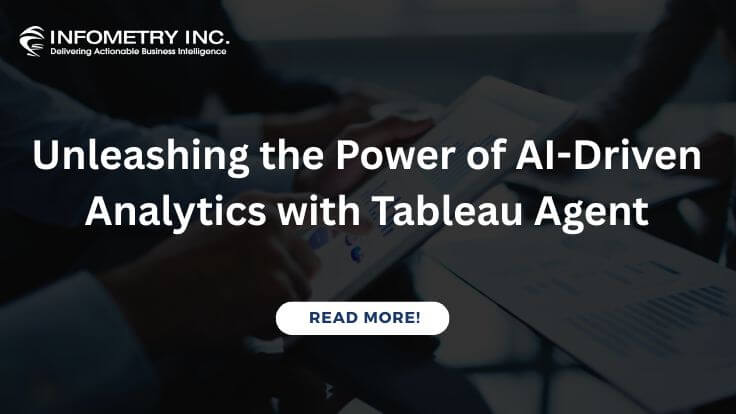
Top 7 Key Traits of Successful BI Strategy
February 2, 2023
Top 10 Effective Data Visualization Best Practices
February 9, 2023In the present interconnected world, Data Analytics is a vital resource for development. Data can assist organizations with good, productive choices to develop numerous capabilities like sales, marketing, finance, and revenue. AI empowers firms of all shapes and sizes to outfit additional value from their data and get ahead of competitors. However, accelerated use of data is not possible with just manual efforts.
We are producing more information today than ever before. Internet users today have around 2.5 quintillion bytes of information consistently. Automation is critical because of the large volume of data being always produced. Artificial intelligence is transforming data analytics as far as we might be concerned and opening new growth opportunities. In combination, AI, data analytics, and automation is enabling enterprises across the globe to accomplish unrivalled speed, efficiency, and results.
As per Gartner, toward the end of 2024, 75% of enterprises will operationalize AI, driving a 5x increase in streaming information and analytics infrastructures. The capacities of AI are poised to expand analytics activities and empower organizations to internalize data-driven decision-making while permitting everybody in the association to manage information productively. This implies artificial intelligence democratizes information across the enterprise and saves data analysts, researchers, engineers, and other information experts from spending time on repetitive manual processes.
Benefits of AI on Data Analysis
According to the Brookings Foundation, AI innovation is transforming all walks of life and has vast applications, including data analysis, decision-making and dissemination.
A few of the ways machine learning and AI are contributing to analytics:
- AI analyzes data using machine learning algorithms to predict future outcomes and reveal trends and patterns.
- AI eliminates errors and offers a greater level of accuracy than traditional business intelligence tools.
- AI automates report generation and makes data easy to understand.
- AI streamlines processes, allowing for insights to be generated faster.
Challenges of AI Implementation in Data Analytics
Despite its many benefits, there are also some challenges and limitations to the implementation of AI in data analytics:
Data Quality
The quality of the data used to train AI algorithms is critical to their accuracy. Poor quality data can result in incorrect or biased predictions and decisions.
Algorithm Bias
AI algorithms can be biased if the training data is biased. For example, if the training data includes a disproportionate number of models from one group, the algorithm may produce limited results.
Lack of Interpretability
AI algorithms can be challenging to interpret, making it difficult to understand how they arrived at a particular decision. This can make identifying and correcting biases or errors in the algorithm hard.
Data Privacy
The collection and use of large amounts of personal data for AI training and implementation can raise privacy concerns. Ensuring personal data protection and compliance with privacy regulations can be challenging.
Lack of Expertise
There is a shortage of experts with the skills and knowledge required to develop and implement AI algorithms, making it difficult for organizations to leverage AI’s potential fully.
Technical Limitations
AI algorithms can require large amounts of computing power and storage, making it challenging for some organizations to implement AI solutions. In addition, AI algorithms can be computationally intensive and may take a long time to train, making it difficult to process large amounts of data in real-time.
Despite these challenges and limitations, AI has enormous potential in data analytics. With continued advancements in technology and best practices, many of these limitations will likely be overcome in the near future.
Why AI for Data Analysis?
AI-powered software can automatically analyze data from any source and convey valuable insights. Customer data analyzed with AI can be life-changing and assist with affecting product development, improving team performance, and letting organizations know what works and doesn’t.
AI is a data science field that uses advanced calculations to permit PCs to learn independently. At the same time, data analysis is the method involved with transforming raw information into clear, significant, and actionable insights. Utilizing AI-guided frameworks in your data analytics permits you to automatically clean, analyze, explain, and visualize your data.
Traditional software requires constant human input. A specialist should control the code when a new process needs to be added or a current capability changes.
On the other hand, AI software with ML requires just beginning human input. AI tools can gain from this information by “taking care of” AI algorithms tagged text samples, also called training data. Successfully they utilize human-labelled data to detect patterns and figure out how to analyze data.
Here is How is Artificial Intelligence Transforming Data Analytics?
AI is having a substantial impact on data analytics in several ways:
Automation
AI algorithms can automatically process and analyze large amounts of data, reducing the need for manual analysis and freeing up time for more complex tasks.
Improved accuracy
AI-powered models can identify patterns and insights in data that would be difficult for humans to detect, leading to more accurate predictions and better decision-making.
Scalability
AI allows for analyzing large and complex datasets, which would be impractical or impossible to process manually.
Personalization
AI-powered models can analyze individual customer data and create personalized recommendations, leading to improved customer satisfaction and increased sales.
Self-service
AI-powered tools are making it easier for non-experts to perform data analytics by providing intuitive interfaces and automation of complex tasks.
Real-time insights
AI enables real-time data analytics, allowing businesses to make quick decisions based on up-to-date information.
Use Cases of AI in Data Analytics
There are many examples of AI being implemented in the field of data analytics:
Predictive Analytics
AI algorithms such as machine learning can make predictions based on past data patterns. For example, a retailer might use AI to predict customer buying patterns and tailor their sales and marketing strategies accordingly.
Natural Language Processing (NLP)
NLP is a type of AI that enables computers to understand and interpret human language. This technology is commonly used in sentiment analysis, which involves analyzing large volumes of unstructured data, such as customer reviews, to determine the overall sentiment about a particular product or service.
Image and Video Analytics
AI algorithms can analyze pictures and videos to extract valuable information. For example, a security company might use AI to monitor surveillance footage to detect suspicious behavior.
Fraud Detection
AI algorithms can detect patterns of suspicious behavior that may indicate fraud. For example, a financial institution might use AI to see unusual spending patterns or transactions outside the norm for a particular customer.
Recommender System
AI algorithms can recommend products or services to customers based on their browsing and buying history. For example, an online retailer might use AI to recommend products to customers based on their previous purchases.
These are just limited examples of how AI is implemented in data analytics. With continued advances in AI technology, we’ll likely see many more innovative applications soon.
Conclusion:
AI is changing data analytics by enabling more developed and automated analysis of large and complex datasets. AI calculations can identify patterns and insights in data that would be difficult or unimaginable for people to distinguish. This considers more exact forecasts, improved decision-making, and the capacity to scale analytics to more extensive datasets. Furthermore, AI-powered tools are making it easier for non-specialists to explore data by providing intuitive interfaces and automation of complex tasks. Overall, the integration of AI into data analytics leads to more compelling analysis and is helping organizations to make better use of their data to drive growth and improve operations.





